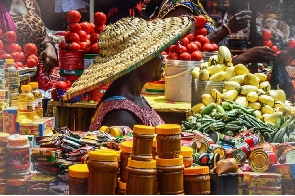 Inflation for July 2023 rose to 43.1%
Inflation for July 2023 rose to 43.1%
Ghana’s inflation will get worse before getting better, finance lecturer at Andrews University in Michigan, USA, Professor Williams Peprah, has stated.
He, however, believed that the rate of increase in inflation would not be the same like in 2022.
Inflation shot up marginally to 43.1 per cent in July 2023, driven by food inflation (55.0 per cent).
Speaking to Joy FM in Accra yesterday, Professor Peprah said commodity prices have been rising on the world market, while the cedi’s performance, which impacts import inflation, had not witnessed a good performance despite recording some stability in recent weeks.
According to him, food inflation in the country had been so high, questioning the government’s agricultural policies, such as Planting for Food and Jobs.
Ten food items recorded inflation higher than the overall food inflation. They included tea and related products (150.0 per cent); cocoa drinks (86.5 per cent); fruit and vegetable juices (66.7 per cent); cereals and cereal products (64.2 per cent); sugar, confectionary and desserts (62.7 per cent); oil and fats (59.5 per cent); milk and other dairy products and eggs (58.3 per cent); coffee and coffee substitutes (58.2 per cent); fish and other sea foods (57.7 per cent) and live animals, meat and other parts of slaughtered land animals (55.2 per cent).
Professor Peprah said the recent World Bank Food Security Report and the International Monetary Fund Country Report on Ghana pointed to the fact that food inflation would get worse before getting better.
The World Bank issued a report on Food Security Index saying we should have anticipated, and also our IMF-Ghana document had already mentioned that the situation will get worse before getting better. So, all these issues indicate that food inflation will be high.
There has been shortage of rice globally in recent times due to the Indian policy.
“The Indians control about 40 per cent of the rice production and has sent some to part of Europe and Africa, so food prices is going to go up because of shortages.
“It is going to get worse before getting better. What I see is that maybe the rate of increase will not be as it happened in November and December last year. The rate of increase may be marginal as we noticed between the previous month of June 2023 and July 2023,” it said.
He advised the government to address some policies within the agriculture sector.
“The government should be able to address some policies and strategies in the agriculture sector to address the farmgate versus the urban market. That kind of issue can be addressed. We should anticipate that inflation will get worse before it starts to come down,” he said.
Analysts anticipate that inflation would go down when the harvest season starts in September 2023 and October 2023, but could go up again in November 2023 and December 2023 because of the festive season.
Watch the latest edition of BizTech and Biz Headlines below: